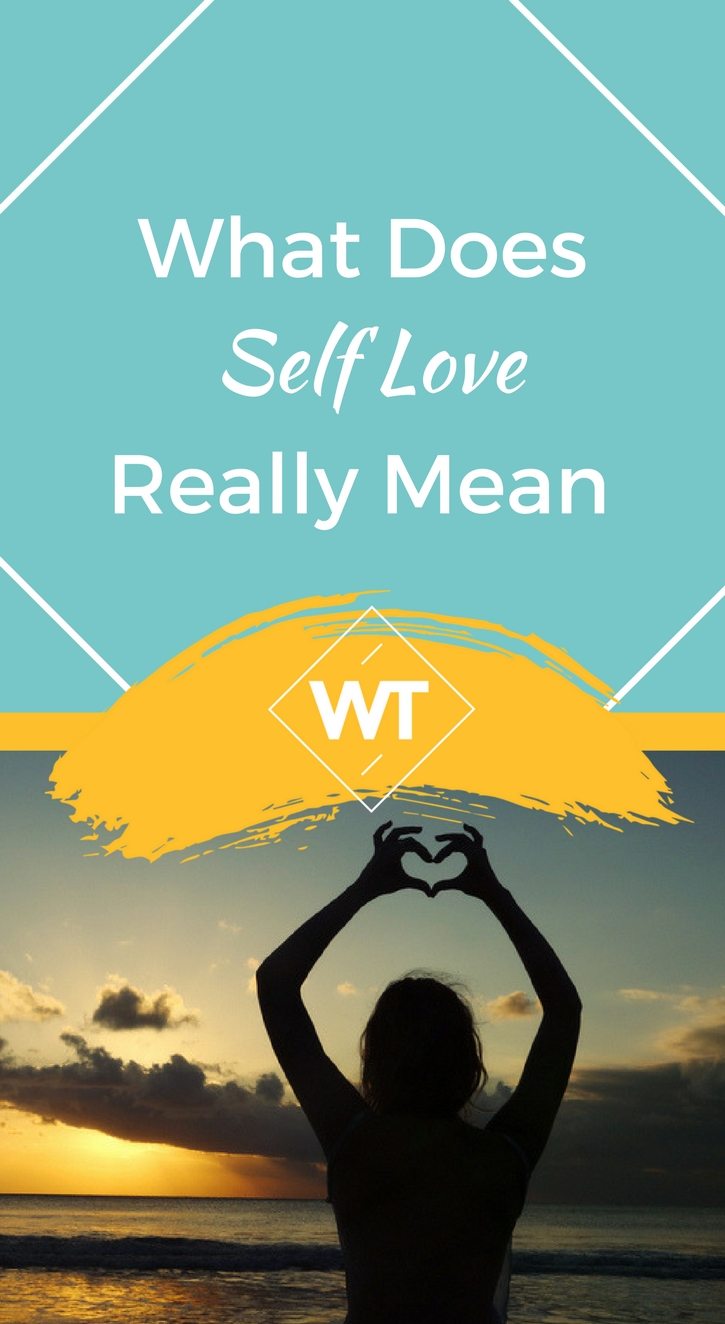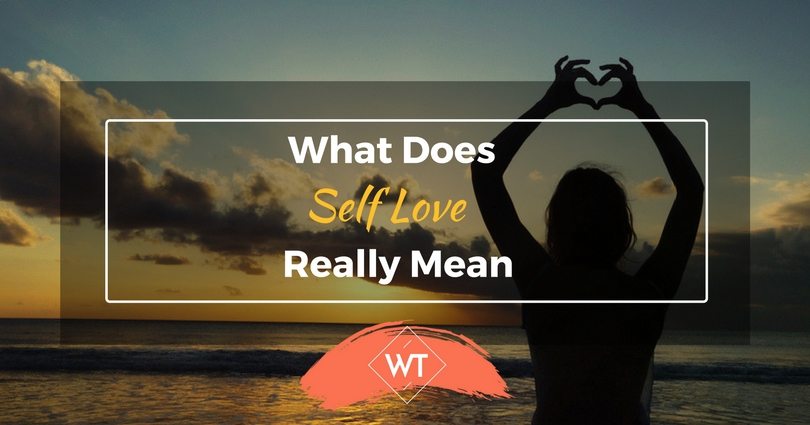What Does Self Love Really Mean?

Self love requires you to be honest about your current choices and thought patterns and undertake new practices that reflect self-worth. ~ Caroline Kirk (Tweet this)
What is Self Love? If you’re wondering what it means to love yourself, the answer it simple: be yourself. There’s no one for you to become, nothing for you to do and nowhere to go. Simply allow yourself to be completely You.
Unless you love yourself, you cannot love anybody else. How could you? If you don’t know how to love the very first person you’ve come in contact with—yourself—how will you ever love another?
Really, what is self love if you have not loved yourself?
So loving yourself is a must, otherwise, you won’t know how to ever truly love another. But let’s get some things straightened out…
Who is the Self?
Before you can love yourself you have to know yourself. A spiritual experience of your true self is primary and self love is secondary and love is tertiary.
Here is the great secret of life: you are not who you think you are, you are a nobody, a nothing… a static, infinite, and absolute zero. That’s right, each and every one of us is a nobody. We are not bodies and we are not our minds. We are the spiritual nothingness that witnesses both the body and the mind, that creates and puts this thing we call a “self” into existence.
When you are compassionate with yourself, you trust in your soul, which you let guide your life. Your soul knows the geography of your destiny better than you do. ~ John O’Donohue (Tweet this)
There are many selves we create throughout a lifetime. These are more appropriately termed as self-images or identities. So often, we make a basic mistake by equating our true selves, with our self-images.
Just ask someone “who are you?” and you will see. They will likely respond with a case history of who they are by sharing their personality traits, their likes, their dislikes, some may even identify with their families, jobs or hobbies. However, our real selves are none of those things, we simply ARE.
This clears up a lot of issues around the idea of self love. First of all, to love yourself is unnecessary, but rather finding yourself is extremely important. Did you need to love yourself as an innocent infant? Of course not, we came into this world as free spirits, untouched by the conditionings of society and inundated in our wonder for life.
One who knows their true self has no ego. There is no identity, there is no “I” loving the “self.” There is no need. There is you, existence and the rest of just a story. What’s not to love?
What is Love?
Next in finding self love is the understanding in what it means to love ourselves. We first have to get clear about what this word “love” actually means.
In most other cultures there is typically more than one word for the word “love.” Only in America is there one word for the word love, with endless meanings to it—hence the confusion around this topic.
To one person, “I love you” could mean friendship while to another it could mean romance or a spiritual connection. Not including the many other customized meanings this word could take on.
So what is love? Like many things, love comes in threes.
The three different types of love are
- Spiritual (Ethos),
- Friendship (Pathos), and
- Romantic (Aeros).
In terms of self love we are typically seeking spiritual love.
Spiritual love is experience in total acceptance. That is why many of the Sages and Mystics talk about love in terms of oneness and annihilation of the barriers of mind and body.
With the absence of mind and body, we connect to others, as spiritual beings we share an identity as infinite potential. So learning to love the self would be much more appropriately referred to as self-acceptance than self love.
So, what is self love? In conclusion, the real self love we are looking for can be found in these two simple places: your true identity and your true acceptance of what that is.
To help you get there, consider the following practices:
BE YOUtiful
The highest form of love is acceptance. Though there is no need to love your true self because it is pure love. You can, however, learn to accept your self-image.
Accept your humanness, flaunt your flaws; otherwise, what you resist will persist. We do not transcend what we deny and resist, we transcend what we can graciously accept.
When we surrender to our imperfection, something magical happens: that love and acceptance turns into poetry.
When you do things from your soul, you feel a river moving in you, a joy. ~ Rumi (Tweet this)
Practice radical honesty
I have written a few articles on radical honesty and authentic expression. You can find them listed under my bio here at Wisdom Times.
I suggest giving them a read if you feel this speaks to you. The reason radical honesty is so important in our journey to self love is that, lies create distance between us as spiritual beings.
When we begin to lie and withhold from others, we become introverted, only focusing on ourselves. We are essentially living in a fear that demolishes all intimacy.
The fear of constantly being “found out” keeps all of our focus on ourselves, making us depressed. Lies are nonsensical explanations of what is—they are made-up stories.
The problem with stories is they build up a huge façade about who we are, which has little-to-nothing to do with who we truly are. Radical honesty annihilates these stories and façades so we can experience our true selves in the presence of another.
For example, many people attempt to hide their emotions (especially anger) in an attempt to be nice. What happens is the phenomenon known as a being “fake.” Anyone who’s experienced this knows how awful it is to withhold emotions.
The connection between you and others is broken until the person eventually blows up. In short, it’s always better to be authentic than fake.
Faking happiness is always worse than authentically expressing anger. What we resist persists—creating a world of suppressed angry people starving for love and connection.
In order to ever experience true self love we must start with true communication.
End dual thinking
We will never accept ourselves if we approach life with the fear-based mindset of right and wrong.
Another Rumi quote says, “Out beyond ideas of wrong-doing and right-doing there is a field. I’ll meet you there.” This isn’t about being ambiguous with our intentions but accepting that ultimately our opinions are narrow in the grand scheme of things.
What we consider right may be harmful for another. And what we think is wrong may be very helpful.
For example, many people think it’s wrong to speak their judgments, so instead they end up lying… which does much more harm in the end.
Rather, be honest about what you don’t know. Also, instead of right and wrong, consider what’s helpful and harmful.
You never know, the very things about you that you presume wrong might exactly what the world needs—don’t think about it, find out!
What is self love? Truth and acceptance!
I will end with a quote from Carl Jung that summarizes my message today.
The most terrifying thing is to accept oneself completely. ~ Carl Jung (Tweet this)
Do you dare to be yourself?









Leave a Reply